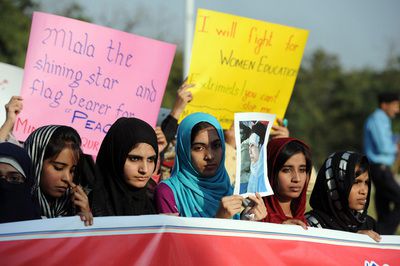As a baby boomer, war has always been pretty cut-and-dried with me. Vietnam does that to people.
It’s not real hard to see issues of war that aren’t hard to figure out in the first place. When people are putting lawn signs out to “liberate Iraq,” the message is pretty clear: If significant foreign policy decisions are going to be based on lawn signs and bumper stickers, sending people off to war might be something you want to think about a little longer.
The most powerful blog post I’ve read today comes from Erin Kotecki Vest, who writes as Queen of Spain. Today, she writes about the morning ritual in her house, waking her 7-year-old up for school and encountering a 7-year-old who doesn’t want to get up and go to school.
So she told her daughter, instead, to “get up for Malala,” the young Pakistani girl targeted by the Taliban in Pakistan for wanting girls to get an education.
And I held her face in my hands, and I looked into her eyes.
Do you understand why you need to go to school today? And every single day?
And with a resolve I see ONLY in my daughter, especially when she’s angry, she nodded.
We then went about our usual morning. Breakfast. Shoes. Backpacking grabbing…and we headed out the door.
As we left in the car I caught her in my review mirror. She was looking out the window.
Honey, are you ok?
I’m fine Mom. I’m mad.
I’m mad too.
Being a girl shouldn’t be hard.
No, it shouldn’t.
Years before we had a reason to go to war in Afghanistan, human rights advocates were trying to tell us what was happening to girls there, and for the most part, nobody much cared.
Then 9/11 happened and we all know the rest.
And we’re justifiably tired of a war that doesn’t seem to have any end, and seems intent on bankrupting the nation, as it did the the Soviet Union before us.
During last week’s vice presidential debate, I thought of that as I heard both candidates try to claim the high ground in their fight, by talking about the 2014 deadline for leaving Afghanistan. Both sides, basically, favor leaving. I favor leaving, too. War stinks and it’s easy to run against it most when it’s lasted for 10 years.
But there’s something about this war that doesn’t necessarily lend itself to easy answers, and debates on the subject are closer to lawn signs and bumper stickers rather than well-considered complexities of foreign policy.
The fact is, sadly, Malala Yousufzai wasn’t the first girl to be punished for wanting an education.
The Taliban, whether in Pakistan or Afghanistan, will stop at nothing to prevent it from happening.
“People are crazy,” Razia Jan, founder of a girls’ school outside Kabul, told CNN last month. “The day we opened the school, (on) the other side of town, they threw hand grenades in a girls’ school, and 100 girls were killed.
Few people are mentioning this on the rare occasion when the war comes up in the presidential debate. Staying guarantees the deaths of more U.S. soldiers. Leaving probably increases the likelihood of more Malalas.
When is war worth fighting? What is the cost-benefit analysis of protecting girls anywhere from those who would deny them something as basic as an education? Is it our problem?
For many people, perhaps, the answer is as easy as figuring out which side “their guy” is on. But as people who watched last week’s debate figured out, “their guy” doesn’t seem to have an easy answer.
And I know exactly how they feel, although I’ll actually say the words they won’t: I don’t know.

